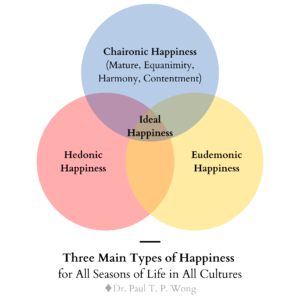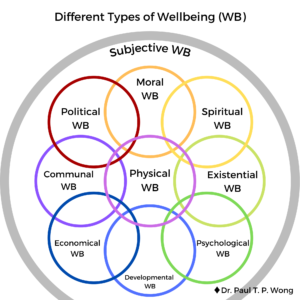Abstract
We want to honour the late Dr. Edward Diener, who laid the foundation for happiness and wellbeing research. No research on wellbeing can get away from his theory and measurement of subjective wellbeing (Diener, 1984; Diener et al., 1985). The lesser-known aspect of Diener’s research on cross-cultural differences and happiness in difficult life circumstances may be even more important in the research on global wellbeing.
In this summit, we will present new developments on different types of happiness and wellbeing as illustrated in Figures 1 and 2. We are grateful that Robert Emmons, one of the co-authors of the Satisfaction With Life Scale, will talk about Dr. Diener and provide some insight of its development. Todd Kashdan will talk about psychological flexibility and well-being. Tim Lomas will focus on eco-connection and environmental wellbeing. Matthew Lee will discuss flourishing in a time of suffering. As an Asian, growing up in a collectivist society and schooled in teachings from Confucianism, Taoism, and Buddhism, I (Paul Wong) will present my vision of mature or noetic happiness (Wong & Bower, 2018), focusing on living in harmony with the self, others, and Heaven and Earth. It is based on the integration between East and West. Aaron Jarden will discuss and synthesize the various presentations.
Figure 1
Three Main Types of Happiness

Figure 2
Different Types of Wellbeing (WB)

Learning Objectives
Participants will learn:
- Ed Diener’s contribution to the fundamental concept and research of subjective wellbeing (SWB).
- The need for a global perspective and include Asian conceptions of inner peace and harmony.
- The need to understand the different pathways to wellbeing, depending on the culture and context.
- The importance of virtue and spirituality as one of the pillars of wellbeing.
(This introduction was for the Summit on “global wellbeing during the pandemic: Honourish Ed Diener” at the International Network on Personal Meaning’s 11th Biennial International Meaning Conference, August 6-8, 2021, Toronto, Ontario, Canada.)
References
- Diener, E. (1984). Subjective well-being. Psychological Bulletin, 95(3). https://ssrn.com/abstract=2162125
- Diener, E., Emmons, R. A., Larsen, R. J., & Griffin, S. (1985). The Satisfaction with Life Scale. Journal of Personality Assessment, 49, 71-75.
- Wong, P. T. P., & Bowers, V. (2018). Mature happiness and global wellbeing in difficult times. In N. R. Silton (Ed.), Scientific concepts behind happiness, kindness, and empathy in contemporary society (pp. 112-134). IGI Global.
Cite
Wong, P. T. P. (2021, August 6-8). Meaning Conference 2021 summit symposium on Global wellbeing during the pandemic: Honouring Ed Diener – introduction. In P. T. P. Wong (Chair), Global wellbeing during the pandemic: Honouring Ed Diener [Symposium]. International Network on Personal Meaning 11th Biennial International Meaning Conference, Toronto, ON, Canada.

 Meaning Conference 2025 will be the INPM’s first in-person conference with a virtual option after the pandemic.
Meaning Conference 2025 will be the INPM’s first in-person conference with a virtual option after the pandemic.